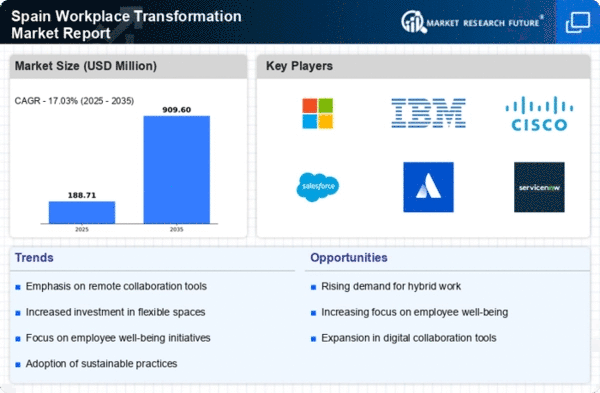Rise of Remote Work Culture
The increasing acceptance of remote work arrangements is reshaping the workplace transformation market. In Spain, a notable shift towards hybrid work models has emerged, with approximately 30% of employees now working remotely at least part-time. This trend necessitates the development of adaptable workspaces that can accommodate both in-office and remote employees. Companies are investing in technology and infrastructure to support seamless collaboration, which is crucial for maintaining productivity. The workplace transformation market is responding to this demand by offering solutions that enhance connectivity and communication among teams, regardless of their physical location. As organizations prioritize employee satisfaction and work-life balance, the focus on creating flexible work environments is likely to continue, driving further innovation in the market.
Focus on Collaborative Workspaces
The demand for collaborative workspaces is reshaping the landscape of the workplace transformation market. In Spain, organizations are increasingly recognizing the value of fostering teamwork and innovation through shared environments. Research suggests that companies with collaborative spaces experience a 15% boost in creativity and problem-solving capabilities. This trend is driving the design of open-plan offices, breakout areas, and multifunctional spaces that encourage interaction among employees. As businesses strive to enhance collaboration, the workplace transformation market is responding by providing innovative solutions that facilitate teamwork and communication. The emphasis on collaboration is likely to persist, influencing how organizations approach their workspace strategies in the future.
Investment in Employee Well-being
The emphasis on employee well-being is becoming a pivotal driver in the workplace transformation market. In Spain, organizations are increasingly recognizing the importance of mental health and overall wellness in enhancing productivity. Reports indicate that companies investing in well-being initiatives see a 20% increase in employee engagement. This trend is prompting businesses to redesign workspaces to promote health, such as incorporating natural light, green spaces, and ergonomic furniture. The workplace transformation market is evolving to provide solutions that prioritize employee comfort and mental health, which may lead to reduced absenteeism and improved job satisfaction. As the focus on well-being continues to grow, it is likely that more organizations will seek to implement comprehensive wellness programs, further influencing the market.
Regulatory Changes and Compliance Requirements
Regulatory changes and compliance requirements are emerging as critical drivers in the workplace transformation market. In Spain, new labor laws and health regulations are prompting organizations to reassess their workplace strategies. Compliance with these regulations often necessitates significant investments in infrastructure and design to ensure employee safety and well-being. For instance, the implementation of social distancing measures and enhanced sanitation protocols has led to a reevaluation of office layouts. This evolving regulatory landscape is likely to drive demand for flexible and adaptable workspaces that can quickly respond to changing requirements. As organizations navigate these challenges, the workplace transformation market is expected to provide solutions that help businesses remain compliant while fostering a productive work environment.
Technological Advancements in Workspace Design
Technological advancements are significantly influencing the workplace transformation market. In Spain, the integration of smart technologies into office design is becoming increasingly prevalent. Companies are adopting Internet of Things (IoT) solutions to create intelligent work environments that enhance efficiency and collaboration. For instance, smart lighting and climate control systems can adjust automatically based on occupancy, leading to energy savings of up to 30%. Additionally, the use of virtual and augmented reality in workspace planning allows organizations to visualize and optimize layouts before implementation. This trend indicates a shift towards data-driven decision-making in workspace design, which is likely to continue shaping the workplace transformation market in Spain as businesses seek to leverage technology for competitive advantage.
















